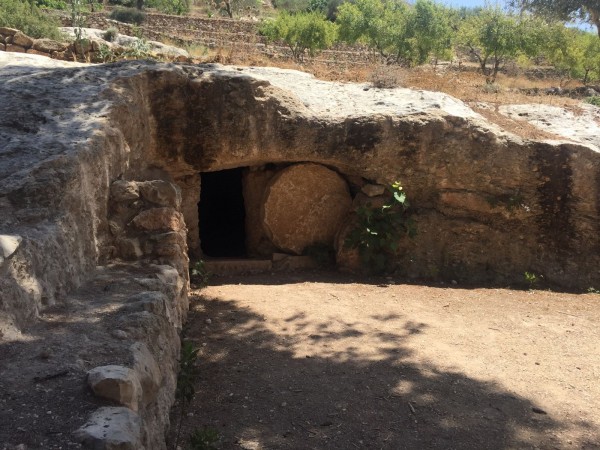
When we read the passion in all four gospels, we can see that there are slight variations about the people present at the crucifixion and burial of Jesus. Interestingly, from all the followers of Jesus that are mentioned in the gospels, there are two people who are always present in all four accounts: Mary Magdalene and Joseph of Arimathea (maybe three with Mary the mother of James and Joseph, See Matt 27:55-28:1; Mark 15:40-16:8; Luke 23:49-24:12; John19:25-20:1). This year on Palm Sunday and Good Friday we read according to Matthew and John that Joseph of Arimathea went to Pilate and asked for the body of Jesus, of whom Joseph was a disciple. He then buried Jesus in a tomb cut on the rock (Matt 27:57-61; John 19:38-42). By ensuring that the body of Jesus was properly buried after the crucifixion, Joseph of Arimathea becomes a key character in the passion narrative. Mark and Luke add more information about Joseph, noting that he was a member of the Sanhedrin (Mark 15:42-47), that he was a righteous man and that Joseph himself took Jesus down from the cross (Luke 23:50-56).
Joseph’s direct request to Pilate to bury a crucified man and Pilate’s approval are, if not problematic, surprising elements from both a narrative and historical point of view. Regarding historicity, it has been noted that the shame of the Roman crucifixion included the denial of a dignified burial. Romans preferred that corpses would decompose on the crosses (this information can be found in any modern commentary on the Gospels, my favorite being that written by Craig S. Keener on the Gospel of John in 2003). From a Jewish point of view, the request to bury Jesus is reasonable, given the command from Deuteronomy 21:22-23 that no corpse shall remain overnight unburied because of the risk of defiling the land.
Additionally, the sudden intervention of Joseph of Arimathea and his disappearance from the narrative afterwards, makes this character notable. A man who has not been mentioned before at all, takes the central place on burying Jesus and ensuring that the prophecy of the resurrection might take place. It is not Peter, nor John, nor any other disciple who takes on this essential part of the passion of Jesus. All four gospels mention Joseph and in all four he appears unexpectedly to fulfill this important duty. And after the burial, Joseph of Arimathea is never mentioned again.
Joseph of Arimathea’s role makes me think of another Joseph that after playing an important part in the life of Jesus disappears and is never mentioned in the gospels: Joseph of Nazareth. Just like the man from Arimathea, Joseph of Nazareth is there to help fulfill the prophecies that Jesus shall be called Son of David (Luke 1:32), that the Messiah was to be born in Bethlehem (Luke 2:4-5; Matt 2:5-6), and that out of Egypt he was called (Matt 2:14-15). Joseph of Nazareth married a woman that was expecting not his child and thus defied a law that requires to denounce Mary publicly (See Lev 20:10; Deut 24:1). Yet, after playing a fundamental role in the life of Jesus, we do not read more about him in the gospels.
Both Joseph of Nazareth and the man from Arimathea come and go in crucial moment of Jesus’ life; just when Jesus needed them the most. There was a Joseph to place Jesus in the manger and a Joseph to place him in the tomb. Both Josephs, the carpenter and the member of the Sanhedrin, act against all odds to ensure critical episodes in the life of Jesus. This idea becomes even more attractive highlighting the etymology and Hebrew root of the name Joseph: May God add, or may God give/increase. I cannot but see Joseph’s name operating in relation to what both men from Nazareth and Arimathea did for Jesus. At the moments when Jesus was most vulnerable, his birth and death, God added, provided, with these two men to be support and to provide for Jesus. These details crate a “Joseph motif” in the canonical gospel’s where both Josephs are called righteous, and they perform indeed virtuous acts for the most vulnerable at that time.
The questions to reflect is how can we be like these Josephs for other people? Are we willing to be there at for the most vulnerable to help them, nurture them, and provide for them? Are we willing to be Josephs that do not need to be all the time at the center of people’s stories, but rather quietly help them?









